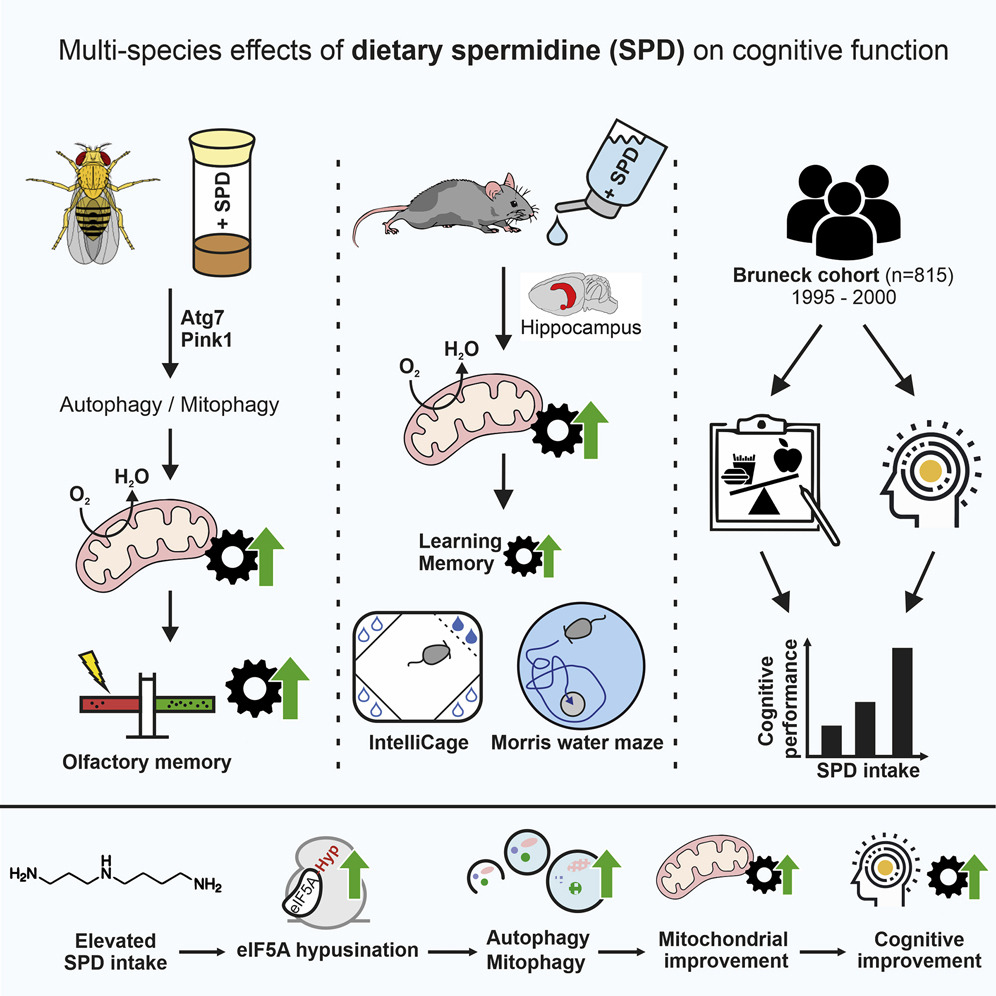
Very excited to share our recent article on the effects of dietary #spermidine (SPD) on neuronal #mitochondria and cognition during #aging. Out this week in @Cell_reports tinyurl.com/ha2n9h5z. This marks my 2nd co-first research article from my PhD time. A long thread 1/12 

After a crazy 1.5 years revision during a global pandemic finally time to celebrate. Take-away for PhD students in aging research: you'll age with your project. Specifically aging + behavior tests = never-ending experiments and lots of new grey hair. 2/12 #AcademicTwitter
It was worth it, though! We analysed the effects of dietary SPD on neuronal mitochondria. In cardiac tissue this was reported by @EisenbergTobias in @NatureMedicine tinyurl.com/tc7hkxja. Using @OroborosI respirometers we showed increased respiration in flies and mice 3/12
This depended on Atg7, Pink1 and Parkin (in flies), highlighting a role of #autophagy and #mitophagy in our setup, likely linked via hypusination of eIF5A (increased in mouse hippocampi). SPD is a substrate for hypusination 4/12
We could detect dietary SPD in the brain (slow uptake kinetics). We saw an exchange of intracellular SPD, rather than increased levels (different for other tissues). Shift in the metabolic balance + increased hypusination likely responsible for the observed effects 5/12
We observed some rejuvenation of the mouse brain proteome. A great back-to-back paper by Tian from Stephan Sigrist’s lab showed similar respiration effects in flies, largely depended on hypusination of eIF5A (declines with age). Worth checking out: tinyurl.com/se7hm6uk 6/12 

This suggests a simple model: dietary SPD -> improvements of neuronal mitochondria via autophagy/mitophagy and/or eIF5A hypusination during aging -> improvement/maintenance of cognitive function. Reminder: SPD, hypusination and cognitive function all decline with age 7/12
There’s a strong implication for hypusination in mitochondrial function and autophagy maintenance, shown by @KatjaSimon4, @aksimonlab, @daniel_puleston, Erika Pearce and others. Reading list: tinyurl.com/78hn2atf and tinyurl.com/nzj9fwwf 8/12
And in humans? SPD is naturally available via human nutrition (check our review tinyurl.com/bn5kewa). @imed_tweets's Stefan Kiechl and colleagues used the Bruneck study's data to show positive associations of dietary SPD intake with higher cognitive performance. 9/12
What’s next? Several clinical trials with dietary SPD are ongoing or about to be finished. At least one of them (Smartage) will look into cognitive functions in an elderly cohort 10/12
There’s still a lot to be learned about the molecular axis polyamines – autophagy – mitochondria – cognitive function. Questions about tissue-specific effects, uptake kinetics, metabolisation and major molecular targets have been only partly studied 11/12
Exciting times for #polyamines research ahead. Shout-out to all our excellent collaboration partners and co-authors @simon_sedej @madllab @LabScorrano @AitakF @UcalMuammer and many many others. Thanks for reading 12/12
• • •
Missing some Tweet in this thread? You can try to
force a refresh


